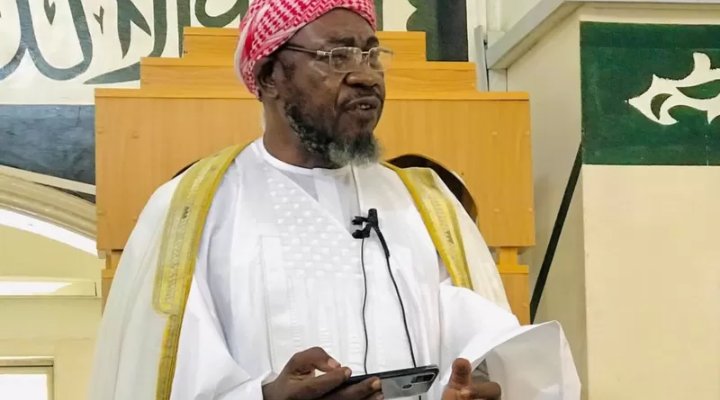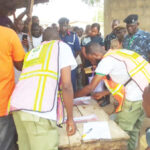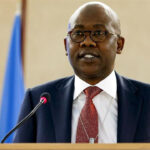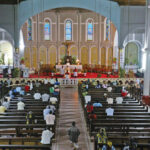The unfortunate March 28 train attack in Kaduna has rightly continued to dominate conversations in Nigeria. Rightly, because you don’t have eight people killed and 168 missing and shove that under the carpet. Well, at least, not all the time. This is a significant event for the deeply disturbed country that Nigeria is.
This time, the impact has resonated from the villa (hopefully, if it managed to penetrate those thick walls) to the streets and the pulpits where what can only be described as a dirty fight played out when the Imam of the Apo Legislative Quarters Mosque, Sheikh Muhammad Nura Khalid was booted out by a Senator Saidu Dansadau-led committee.
- More imams must speak on Nigeria’s ugly situation – Sheik Khalid
- Nigeria: losing its most valuable asset
The imam’s crime, which the senator found intolerable, was to use the mimbar to demand that Nigerian lives be protected and to ask the electorate not to vote if their lives are not secured. That, apparently, was a sacrilege the senator could not tolerate. Surprising since he seems massively tolerant of the massacres that have been going on in his native Zamfara State, which has earned the moniker the epicentre of the country’s banditry challenge.
What is even more shocking is that in the defence of his decision to sack the imam, Dansadau on the BBC Hausa Service asked Nigerians to tolerate the present insecurity in the country because we are paying for our sins. He railed against the imam for daring to ask people not to vote and asking rhetorically if the imam realised the implication of asking people not to vote!
Clearly, the senator did not pause to wonder about the implication of losing hundreds of lives to banditry or terrorism as compared to the thing that matters to him more—politics.
And so he goes on a rant, saying the Imam should not criticise the government because it is a dangerous thing to do, because the mosque is not a place to lob verbal grenades against a woefully underperforming government and that the implication of calling on people not to vote (even if the imam based this on the premise of a guarantee of safety, which is a reasonable request by all considerations), is simply unacceptable.
His position, he said is based on the fact that they, who have been in positions of leadership and have remained close to power, know exactly what is happening in the country—privileged information he could not publicly share and the ONLY solution would be for people to pray.
It gets worse.
“In all of this catastrophe, Dansadau which is in the thick of it has only lost four persons because of the (quantity or quality) of prayers,” he had said. Loose translation from Hausa.
As a Muslim, I find Dansadau’s sanctimonious posturing baffling, absurd and a dangerously fatalistic approach to a serious problem. Even more absurd is the claim about his native Dansadau and its implication especially when juxtaposed to the train attack. The passengers on that train, according to his logic, are not prayerful enough, therefore wholly unworthy of divine favour and, therefore, are a reasonable price to pay for our sins, whereas his village people, pious, prayerful and steadfast, are thriving, barely scratched, in an ocean of banditry.
It is a callous, thoughtless thing to imply especially to families of loved ones who are either in mourning over their dead or in anxiety over their missing ones. It is a heartless thing to say to a nation in shock.
How the senator fails to see this posturing and claims as problematic is beyond me. What then is the point of going to vote in bad leaders, as we have repeatedly done over the years, so they could mismanage our affairs since bad governance, criminality and habitual massacres of the innocent are all down to our sins?
It would be equally simplistic and petty to suggest that if the senator is so blatantly fatalistic, he should remove his hands from politics, confine himself to the mosque and pray for the good of the country on behalf of the poor sinful people. Just as it would be to point out that countries far less prayerful and far more sinful by the senator’s parameters are not so blatantly misgoverned or afflicted.
But I will not be that petty. Instead, I will remind him that the same faith he tries to use as a basis for his ludicrous posturing asks, no, demands, that one should act first and then trust in God. In that order. This is amply demonstrated when a Bedouin arrived at the Prophet’s mosque in Madinah, disembarked from his camel and made for the entrance, leaving his camel unattended. The prophet (PBUH) who was sitting outside called him and asked him in whose care he had left his camel and the Bedouin, very much like the senator said, “In the hands of God and his messenger.”
Had the Prophet (SAW) not told him to go and tether his camel, secure it and then commit it to the care of God? Why is the senator conveniently forgetting about the crucial role of human agency in problem-solving or the numerous verses in the Qur’an that tie actions with faith and lump it all on God?
You see, we play too much in this country and use faith and God as a blinder to goad people to their deaths.
Politics and religion have been so dangerously intertwined in a very unhealthy way that even our politics has acquired a strange faith that is neither Christianity nor Islam and is often inhumane and callous.
We remember the pulpit wars that preceded the 2015 elections, where many Muslim clerics did exactly what Imam Khalid did, attacking the government and the person of Goodluck Jonathan, condemning his equally deplorable government and imploring Muslims to vote him out. Many churches on the other hand organised crusades and unleashed prayer warriors who presented Jonathan as chosen by God and any Christian who opposed him was doing the devil’s work.
When Rev. Father Ejike Mbaka, famously or infamously, used the pulpit to preach against Jonathan and asked that people vote for Buhari, I expect Senator Dansadau found that convenient, almost as convenient as he would have found the regular calls from the mimbar by imams on election eves guiding people to go out and vote for certain candidates.
To pretend that both mosques and churches do not play an active role in politics would be hypocritical. It explains why politicians seeking office kneel before imams and pastors, hoping to get that endorsement. To now sack faith leaders for demanding better governance and security for the people is even more hypocritical. On this, Dansadau has erred.
But then again, why am I railing against the senator? Did the president himself not say the same thing when in December 2020 he had said only God can supervise Nigeria’s borders. If I were to nitpick, I would say the use of the word only connotes the negation of all of the army, the customs, police, immigration and the myriad security agencies we have, not to talk of high-tech surveillance equipment that countries far smaller, with fewer resources than Nigeria, are deploying to secure their territory and the lives of their citizens.
Whatever the case, the optics are not looking great. It is the month of Ramadan. Dozens of families have started their fast either burying their loved ones or not knowing where they are because they have been abducted by criminals.
What happened last week on the train to Kaduna is a series of governmental failures. Yes, there was precedence, a previous attempt at derailing the train. Reports suggest that there was intelligence about a possible attack. The suggestion by those in the intelligence services that the intelligence wasn’t actionable is laughable. With whatever intelligence was gathered, a serious security outfit would put these through wargame analytics to analyse and predict possible points and strategies of attacks and develop counter scenarios for that. Yet rather than point out these lapses, Dansadau, like those unscrupulous Twitter users who bullied poor Chinelo while she lay dying on that train, chooses to kick Nigerians when they are down. It is convenient to blame God or the supernatural for man’s failures. Same as when criminals are caught and they blame it on the devil. There is everything wrong with this posturing.

 Join Daily Trust WhatsApp Community For Quick Access To News and Happenings Around You.
Join Daily Trust WhatsApp Community For Quick Access To News and Happenings Around You.


